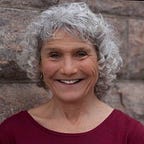Easing My Son’s Angst Is A Quick But Short-Term Fix
Better to encourage him to tolerate — and learn from — painful moments
“Imagine you’ve bought a piece of farmland,” I say to my son. We are having one of our long, catch-up phone calls, which have become extra precious since he moved to San Francisco for a job promotion a couple of months ago. The thrill of the move has mellowed, and he is missing his New York friends and haunts, so much so that he questions whether he made the right choice in leaving.
At 24, my young man hasn’t lived long enough to see life as a long haul or to appreciate that major life decisions can take years to play out. A competitive athlete, he’s results-driven and not particularly patient, especially with himself. Homesickness snuck up on him, and now it’s stoking his fear that he’s blown up his life. Rather than try to persuade him otherwise, I conjure the image of the farm:
“The land is fallow,” I continue, “so you buy a tractor and all the other equipment and supplies you need. You invest all of your time and energy in tilling the soil, digging rows, planting seeds, and watering. You throw your whole self, body and soul, into it, just as you did with lacrosse. Except, the results won’t appear like numbers on a scoreboard. Not until the first shoots break through the soil will you know if your hard work has paid off. And that’s going to take time.”
I want to end this scenario with the promise that his crops will grow, just as I want to promise that he will thrive in San Francisco. I made such sweeping promises all the time when he was very young — assuring him, for example, that he’d make a team he was trying out for or win a game he was about to play — to boost his fledgling confidence or assuage his fears. But I resist my maternal urge to save him from emotional angst. Instead, I assume my new responsibility, which is to teach my young man to tolerate being in limbo, to learn to accept not knowing how life will unfold, and to trust that every experience, however painful, will make him a stronger, wiser human being.
It is a lesson that I wish someone had taught me when I was his age.
Don’t get me wrong: I would not have the blessed life I do, with my loving husband, and exceptional daughter and son, had I not made the exact choices — and mistakes — I did when I was young. Still, during self-doubting moments, I can’t help but wonder how much more I would have grown professionally had I sat tight and endured the frustration and loneliness of being a reporter in “Podunk” towns, instead of hopscotching from job to job, and place to place.
Yes, I ultimately found satisfaction in a career that I love, and yet, it rankles me occasionally to consider how much further I could have gone, and to know that instead of seeing things through, I indulged my intolerance for pain and fled, repeatedly. These are footsteps that I don’t want Ben to follow.
Not that he would. Although he has always sought and taken seriously my counsel about all kinds of decisions — including the one about moving to San Francisco — he is, at the end of the day, someone who listens to his own mind. He is determined and often stubborn.
We are cut from the same cloth.
Had people advised me to hang in every time I wanted to dump a job for a “better” one, I’m sure I wouldn’t have listened. My emotional rather than rational side ruled back then. I made choices to win immediate, albeit short-term relief from my suffering, long-term consequences be damned.
Ben is far more logical. He spent months calculating the pros and cons of moving to San Francisco, including consulting family and friends. Selfishly, I didn’t want him to go because of how much I’d miss him. Had I discouraged him for any reason, however, he would have felt unsupported and gone anyway. Instead, he went knowing that I had his back, which made it easier for him to reveal his momentary misgivings.
It hurts to hear Ben hurt, and yet, I’d do him no favor by indulging his half-hearted and brief fantasy of returning to New York. Doing right by him means being his sounding-board, empathizing with him, and offering that every experience, however painful, is a teachable moment, a light that will guide him further down the path of knowing himself and building the life he wants.
Deep down he knows this, and that the benefits of having moved outweigh the losses. In fact, days after we spoke, he’d recovered from his blues and affirmed that he’d made the right choice. He knows that he’s in store for some up and downs, like occasional homesickness, which will have to run its course. He also knows that he can call up the image of the fallow farm anytime he needs a boost while waiting for the best that’s yet to come.
